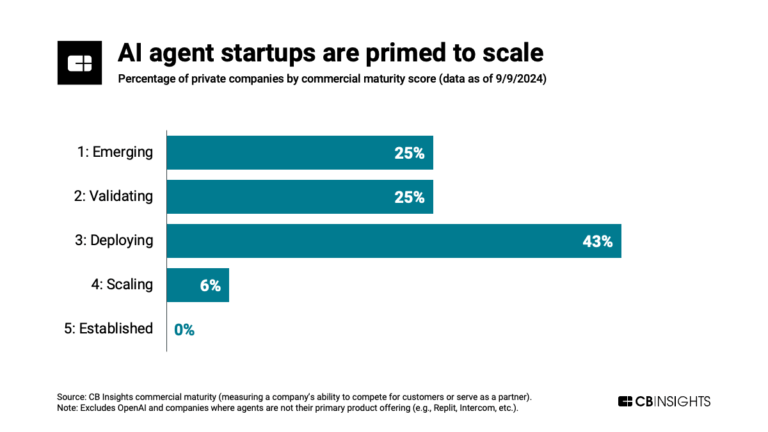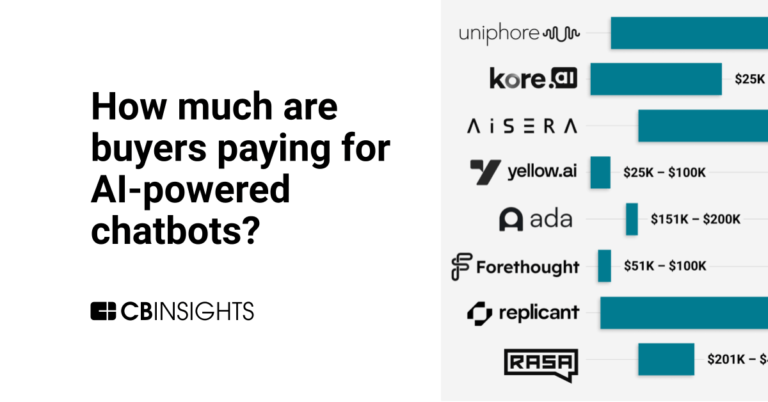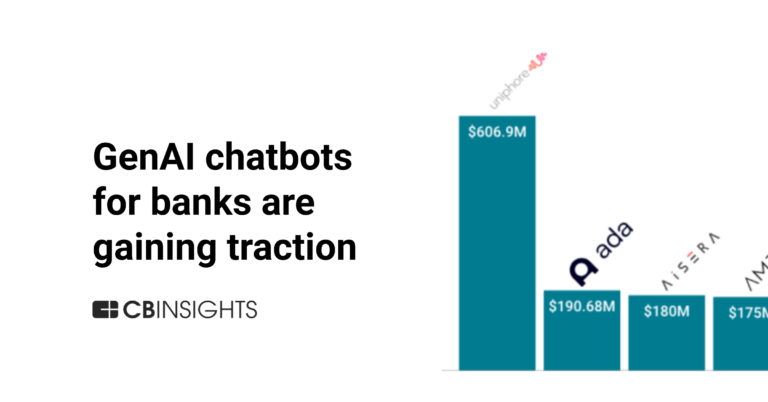
Ada
Founded Year
2016Stage
Series C | AliveTotal Raised
$190.73MValuation
$0000Last Raised
$130M | 5 yrs agoMosaic Score The Mosaic Score is an algorithm that measures the overall financial health and market potential of private companies.
-52 points in the past 30 days
About Ada
Ada specializes in artificial intelligence (AI) powered customer service automation within various business sectors. The company offers a platform that enables enterprises to resolve customer inquiries efficiently across multiple channels and languages without the need for extensive human intervention. Ada's solutions cater to industries such as e-commerce, financial technology, software as a service (SaaS), and gaming. It was founded in 2016 and is based in Toronto, Canada.
Loading...
Ada's Product Videos


Ada's Products & Differentiators
AI Agent
Ada is the leader in AI customer service, designed to be your #1 customer service employee. Businesses build AI agents on Ada, an AI customer service platform that makes managing AI agents as seamless as managing a human team member. With built-in capabilities to test, measure, coach, and continuously improve AI agent performance, Ada ensures customer interactions are always relevant, accurate, and secure. AI agents built on Ada are powered by the Ada Reasoning Engine™, continuously learning and evolving to deliver extraordinary customer service at scale.
Loading...
Research containing Ada
Get data-driven expert analysis from the CB Insights Intelligence Unit.
CB Insights Intelligence Analysts have mentioned Ada in 5 CB Insights research briefs, most recently on Oct 17, 2024.
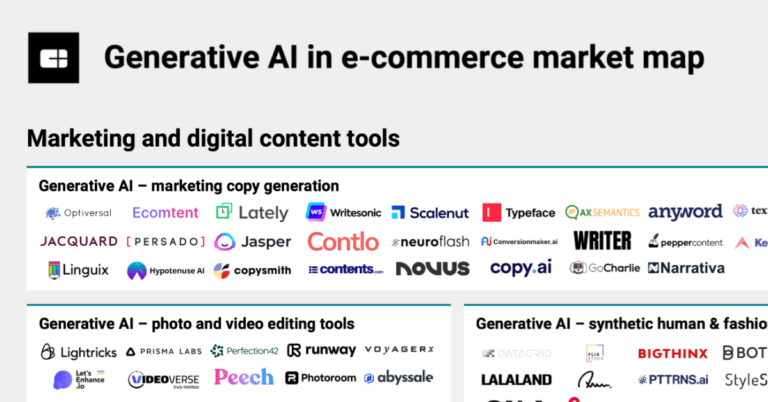
Oct 17, 2024
The generative AI for e-commerce market map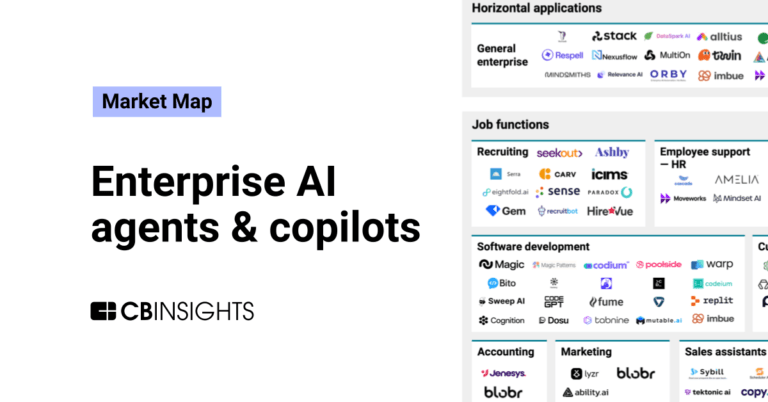
Aug 7, 2024
The enterprise AI agents & copilots market mapExpert Collections containing Ada
Expert Collections are analyst-curated lists that highlight the companies you need to know in the most important technology spaces.
Ada is included in 6 Expert Collections, including Unicorns- Billion Dollar Startups.
Unicorns- Billion Dollar Startups
1,297 items
Artificial Intelligence (AI)
37,256 items
Companies developing artificial intelligence solutions, including cross-industry applications, industry-specific products, and AI infrastructure solutions.
Sales & Customer Service Tech
1,112 items
Companies offering technology-driven solutions for brands and retailers to enable customer service before, during, and after in-store and online shopping.
Generative AI
2,951 items
Companies working on generative AI applications and infrastructure.
AI Agents & Copilots Market Map (August 2024)
322 items
Corresponds to the Enterprise AI Agents & Copilots Market Map: https://app.cbinsights.com/research/enterprise-ai-agents-copilots-market-map/
AI agents
376 items
Companies developing AI agent applications and agent-specific infrastructure. Includes pure-play emerging agent startups as well as companies building agent offerings with varying levels of autonomy. Not exhaustive.
Ada Patents
Ada has filed 8 patents.
The 3 most popular patent topics include:
- computational linguistics
- natural language processing
- artificial intelligence

Application Date | Grant Date | Title | Related Topics | Status |
|---|---|---|---|---|
9/7/2022 | 4/1/2025 | Natural language processing, Computational linguistics, Disability sport classifications, Machine learning, Artificial intelligence | Grant |
Application Date | 9/7/2022 |
|---|---|
Grant Date | 4/1/2025 |
Title | |
Related Topics | Natural language processing, Computational linguistics, Disability sport classifications, Machine learning, Artificial intelligence |
Status | Grant |
Latest Ada News
Nov 5, 2025
By Ethan Sam, Correspondent | Wednesday, 05 November 2025, 02:22:55 PM IST Running an online store today isn’t just about listing products—it’s about creating smooth, engaging conversations with your customers. That’s where chatbots come in. They help answer questions instantly, recover abandoned carts, send order updates, and even showcase your products—all without you needing to be online 24/7. The good news? You don’t need to be a tech expert to get started. In fact, the best chatbot builders for ecommerce are designed with beginners in mind: visual flow builders, ready-made templates, and simple connections to platforms like Instagram , WhatsApp, and Facebook Messenger. In this guide, we’ll explore five of the best chatbot tools for ecommerce beginners—covering their standout features, ease of use, and how each one can help you grow sales while saving time. By the end, you’ll know exactly which tool fits your business. 1) SendPulse — All-in-one, beginner-friendly, and ecommerce-ready If you’re starting from scratch and want the fewest roadblocks, SendPulse is an excellent choice for beginners. It combines website chat, Instagram, WhatsApp, Facebook Messenger, SMS, email, and more in one place, so you can start simple and expand when you’re ready. The visual builder is drag-and-drop and built for marketers, not developers, with conditions, loops, and reusable pieces you can copy between bots in the same channel. It also includes a unified inbox for human takeovers, which keeps conversations from different channels in one view for your team. Where you can deploy You can embed a website chat widget, automate Instagram Direct (including comment auto-reply and story mentions), and connect Facebook Messenger and WhatsApp. SMS is built in, too, so you can add text messages to your abandoned-cart or post-purchase flows when it’s appropriate. Channel growth essentials SendPulse supports the growth mechanics beginners actually need: Ref URL deep links for Facebook/Instagram/WhatsApp (with the Instagram caveat that direct DM links aren’t supported by the channel itself), QR codes you can place on packaging or at the checkout counter, and Click-to-WhatsApp ads that launch your welcome flow right from an ad click. For WhatsApp, it provides official API support, letting you manage templates (including marketing, utility, and authentication categories), send commerce messages (product catalogs and flows), and monitor quality rating with alerts if performance slips. Build once, grow everywhere Under the hood, SendPulse keeps omnichannel continuity, so a subscriber who starts on Instagram and later writes on WhatsApp still looks like one person in your system. The visual flow builder is intuitive, supports conditions and loops, and lets you reuse whole flows across bots in the same channel—handy when you create a welcome flow you want to replicate. Revenue-driving automations For ecommerce, SendPulse hits the key automations: event-based triggers (visit, cart, purchase), abandoned cart recovery, broadcasts that respect each channel’s rules, and segmentation that can reference attributes, events, and cohorts. You can display product cards in WhatsApp conversations, collect reviews/UGC after delivery, and route tricky cases with human takeover rules so an agent can jump in from the unified inbox. On the measurement side, you get funnel analytics (opt-in → conversion) and revenue attribution by campaign or channel, plus GDPR/consent tools and policy-compliant WhatsApp/Messenger connections. Pricing The platform offers a free plan covering 3 chatbots, 500 subscribers, and 10,000 messages monthly. SendPulse’s Pro plan for $8 has no limitations on chatbots, live chat, and messages. Bottom line for beginners If you want one tool that’s friendly on day one and deep enough to power real ecommerce workflows later, SendPulse checks the most boxes from your dataset with the fewest compromises. 2) ManyChat — Social-first marketing with strong Instagram and WhatsApp ManyChat is popular with social-driven marketers who live on Reels, Stories, and comment threads. You’ll notice it pairs a slick visual Flow Builder with channel-specific tools that make Instagram and Messenger campaigns feel native. The interface is approachable, and there’s a template gallery that helps you stand up proven “stories” for marketing and support. ManyChat also supports WhatsApp via the official API, so you can reach shoppers who prefer the green app. If your brand’s top-of-funnel lives on Instagram, this is a natural fit. Where you can deploy ManyChat supports Instagram DM (and auto-reply to comments), Facebook Messenger, WhatsApp (official BSP), and SMS. A website chat widget isn’t the star here (and often relies on Messenger), so think of ManyChat as your social/messaging specialist rather than your website assistant. Growth and re-engagement You get referral deep links and QR codes across channels, plus Click-to-WhatsApp ads. For WhatsApp, ManyChat provides in-platform template management, supports all template categories, includes commerce messages (product catalogs), and even shows a WhatsApp “Health” widget for quality rating monitoring. One limitation to note: one bot per WhatsApp number—no single dashboard for multiple numbers. Marketing workflows for beginners ManyChat handles broadcasts (with channel-compliant rules like Messenger’s post-24-hour policies), segmentation via tags/fields/events, and event-based triggers (e.g., a user comments on an IG post or taps a Quick Reply). Abandoned cart flows are available and pair well with the Shopify integration, which syncs products, orders, and discounts. The rich UI (quick replies, carousels, product cards) is a core strength and keeps shopping conversations visual. Team operations and analytics There’s a unified inbox for live chat, clean handoff to humans, funnel analytics, and revenue attribution so you can see which flows pull their weight. GDPR and platform policy compliance features are part of the package, helping you stay within each channel’s rules. Pricing ManyChat has a free plan where you can take advantage of communication with 1,000 contacts. Its Pro plan at $15/month offers unlimited contacts, unlimited tools, and keywords. The service also has an Elite plan, allowing you to customize your experience to meet your needs. For the pricing, you should contact the company's customer support. Bottom line Choose ManyChat if Instagram is your main stage and you want fast wins with comment-to-DM, WhatsApp catalogs, and social-first automations. 3) TARS — High-converting website conversations and WhatsApp campaigns TARS is built around the idea that web forms are often the bottleneck. Instead of asking visitors to fill fields, you guide them through a chat-style conversation on your site or landing page. That is especially effective for PPC campaigns, where you want to capture qualified leads without drop-off. TARS also offers a WhatsApp Engagement Suite so you can redirect ad clicks into WhatsApp and follow up with message templates. If your priority is converting traffic already hitting your site or ads, TARS deserves a look. Where you can deploy You can embed a website chat widget and also deploy to Facebook Messenger. For Instagram DM automation, TARS doesn’t position itself there. On WhatsApp, it supports the official API, along with Click-to-WhatsApp ads that land prospects directly into a bot flow. Growth, content, and commerce You can use QR codes for WhatsApp entry. Referral links aren’t a focus (the platform leans more toward website embedding and ad flows). For WhatsApp, TARS supports template management and template categories, with partial commerce support—you can surface products, but you won’t find the deeper catalog/flows experience other tools offer. There’s no built-in quality rating dashboard for WhatsApp. Beginner workflows On marketing, broadcasts aren’t the emphasis here; TARS bots are session-focused and typically user-initiated. Segmentation exists but is basic, event triggers are limited, and there’s no out-of-the-box abandoned cart or synced product catalog cards. The rich UI supports images and buttons (not advanced carousels by default). Operations and insight TARS provides live chat handover and a unified view for web conversations, with analytics that show visits, completion rates, and drop-offs—helpful for optimizing funnels from ad click to lead. GDPR/consent practices are covered. If your main pain is form drop-off on the website, TARS is a focused tool that can lift conversions quickly. Pricing You can enjoy 50 conversations per month at no cost. To have fewer limits, you’ll need a Premium paid plan starting at $499/month for 500 conversations and advanced LLM models. For big enterprises, the service offers custom pricing, which you can discuss with the company’s representatives. Bottom line Pick TARS when your budget goes into paid traffic and your biggest win is turning more of those clicks into leads through conversational landing pages, plus basic WhatsApp campaigns. 4) Outgrow — Interactive quizzes, calculators, and chat-style lead capture on your site Outgrow shines when your growth motion is educational or diagnostic—think “find your fit” quizzes, product finders, and ROI calculators embedded on your website. It gives you the look and feel of a chat without requiring a messaging app account, which is perfect for pre-cart lead capture. The builder is no-code and tuned for marketers, and there’s a template library of high-converting experiences you can customize. A 14-day free trial makes it easy to test. If you’re focused on collecting leads before the cart rather than managing post-purchase conversations, this is a strong fit. Where you can deploy Outgrow creates website chat-style widgets and landing experiences. It does not connect to WhatsApp, Instagram DM, Facebook Messenger, or SMS, so it’s not an omnichannel messaging platform. Growth and follow-ups Outgrow doesn’t include referral deep links or QR codes for messaging. There’s no broadcast messaging, and it doesn’t hold a unified inbox or human takeover for live agents since experiences are self-contained. You can collect feedback and responses via your interactive flows and send them to your CRM. Ecommerce automations This is not an order-, cart-, or catalog-centric tool. There’s no abandoned cart functionality, no event-based triggers from your store, and no product catalog cards for messaging apps. Use it early in the journey: qualify a visitor, recommend a product, and push them into your store or email list. Builder and insights The visual builder is approachable, and while it doesn’t advertise a library of reusable sub-flows, you do get a large set of templates. Analytics show how many visitors start, finish, and convert—good enough to compare outcomes across quizzes or calculators. GDPR options are included. Pricing Although the tool doesn’t offer a free tier, it still has a 14-day free trial. If you are sure about purchasing Outgrow’s paid plan, you can start with a Freelancer plan costing $14/month and offering 3,000 leads per year. A Freelancer Pro plan for $25 gives you 12,000 leads per year. Bottom line Outgrow is a smart add-on for top-of-funnel lead generation on your website. Pair it with a messaging platform (like SendPulse or ManyChat) to handle cart recovery and post-purchase relationships. 5) Ada — Enterprise-grade AI for customer support and deflection Ada is built for customer service at scale, helping large brands deflect tickets and guide customers in many languages. It offers a drag-and-drop builder for non-technical staff and taps AI so answers feel conversational and context-aware. Ada integrates with support tools for agent handoff, so complex issues get routed gracefully. It can sit on your website and extend to channels like Messenger, SMS, and WhatsApp via the official API. If your goal is to reduce support volume and speed up answers with AI, Ada fits that brief. Where you can deploy Ada runs as a website chat widget, integrates with Facebook Messenger, and supports SMS and WhatsApp (official BSP). It can support Instagram Direct via integration, though comment auto-reply isn’t the focus. Growth and campaigns Ada isn’t a broadcast or campaign tool. It doesn’t provide referral deep links or QR code triggers for social growth, and broadcast messaging isn’t the intent—it’s a customer-initiated support experience. Ecommerce and AI Ada personalizes answers using user context and can proactively prompt shoppers on the web (e.g., “Need help with checkout?”). It doesn’t ship abandoned-cart or catalog cards out of the box; its WhatsApp commerce support is partial, focusing more on service than shopping inside the thread. For WhatsApp templates, creation typically happens in WhatsApp Manager, with Ada using approved templates. Analytics help quantify deflection and outcomes. Team workflows There’s robust agent handoff via your help desk, but Ada doesn’t market a native unified inbox for multichannel sales chat. For enterprises centralizing support, that’s fine—you’ll live in your existing ticketing tools. Pricing The platform doesn’t clearly state its pricing on the website. You can contact customer support to find out the price based on your business requirements and goals. Bottom line Consider Ada when your top KPI is ticket deflection and CSAT, not campaign performance or cart recovery. Final Thoughts Think of chatbots as your store’s best sales assistants—always available, always ready to answer questions, recover carts, or guide a shopper to checkout. Each tool on this list has its strengths: ManyChat for social selling, TARS for ad-driven conversions, Outgrow for lead capture, and Ada for enterprise-level support. But if you want a single platform that helps you sell more, work less, and connect with customers everywhere they shop, SendPulse is the one to start with. It’s simple enough for beginners, powerful enough to scale, and built to turn conversations into sales—without the steep learning curve. Read More News :
Ada Frequently Asked Questions (FAQ)
When was Ada founded?
Ada was founded in 2016.
Where is Ada's headquarters?
Ada's headquarters is located at 46 Spadina Avenue, Toronto.
What is Ada's latest funding round?
Ada's latest funding round is Series C.
How much did Ada raise?
Ada raised a total of $190.73M.
Who are the investors of Ada?
Investors of Ada include Version One Ventures, Bessemer Venture Partners, FirstMark Capital, Burst Capital, Accel and 16 more.
Who are Ada's competitors?
Competitors of Ada include WIZ.AI, Hyro, Sierra, Flip CX, Cognigy and 7 more.
What products does Ada offer?
Ada's products include AI Agent and 2 more.
Who are Ada's customers?
Customers of Ada include Trust & Will , Life360, Monday.com and Checkr .
Loading...
Compare Ada to Competitors

Intercom operates as an artificial intelligence (AI) customer service company that operates within the customer support industry. The company provides AI tools that aim to improve customer service efficiency. Intercom serves businesses that are interested in utilizing AI technology for their support operations. It was founded in 2011 and is based in San Francisco, California.

Inbenta specializes in conversational AI and automation within the customer service sector. The company offers a suite of products, including AI-enabled chatbots, search tools, and knowledge management systems designed to enhance customer experience and streamline service operations. Inbenta's conversational AI platform is utilized across various industries to automate customer interactions, provide self-service options, and improve overall customer satisfaction. It was founded in 2005 and is based in Allen, Texas.

Kustomer provides customer service solutions within the Customer Relationship Management (CRM) platform industry. Its offerings include a platform for managing customer interactions across channels and support tools that utilize automation and artificial intelligence (AI). It serves sectors that require customer relationship management and service automation, using data and AI. It was founded in 2015 and is based in Short Hills, New Jersey.

Sierra provides a conversational artificial intelligence platform for businesses to deploy artificial intelligence agents for customer support across multiple channels and languages. Sierra's solutions can integrate with existing technology stacks and focus on security and compliance. It was founded in 2023 and is based in San Francisco, California.

Yellow.ai is a customer service automation platform that utilizes generative AI to improve support operations for enterprises. The company provides AI-driven tools for automating and personalizing customer interactions across channels such as voice, chat, and email, while maintaining security and compliance. Yellow.ai's platform integrates with existing tech stacks, offering no-code solutions for customization and deployment. Yellow.ai was formerly known as Yellow Messenger. It was founded in 2016 and is based in San Mateo, California.
Indemn is involved in machine learning powered chatbots within the insurance sector. The company has a platform for online insurance services, allowing customers to inquire about insurance and purchase coverage. They focus on Event and Wedding Insurance for hosts seeking to mitigate potential issues related to their events. It was founded in 2021 and is based in New York, New York.
Loading...

